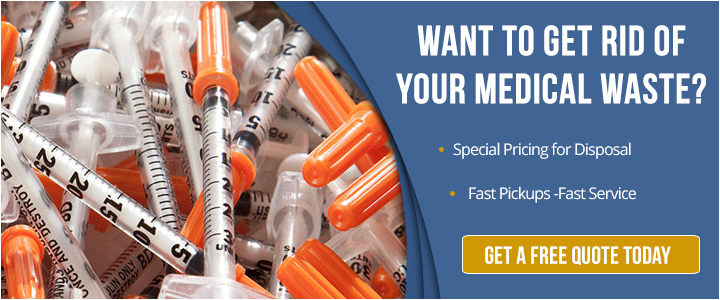Chemotherapy treatments generate some of the most hazardous types of medical waste.
Because of the toxicity and corrosive nature of chemotherapy waste, hospitals and other medical facilities that handle this type of waste should follow strict protocols during disposal.
As a medical waste generator, you are responsible for managing all your waste from the moment it is generated to its final disposal, according to the Resource Conservation and Recovery Act (RCRA).
Although not all medical waste is considered hazardous - in fact, 85% of waste health care activities generate is non hazardous - some chemotherapy waste is among the most hazardous. That is why it is important for any facility that generates chemotherapy waste to have a disposal plan in place that meets all state and federal regulations.
Types Of Chemotherapy Waste
There are several types of chemotherapy waste your facility may generate. Among the various types are the following:
Controlled Substances
 In any healthcare facility, medications are commonly found. In a facility that administers chemotherapy, painkillers like morphine or hydrocodone may be among those found.
In any healthcare facility, medications are commonly found. In a facility that administers chemotherapy, painkillers like morphine or hydrocodone may be among those found.
The U.S. Drug Enforcement Administration (DEA) requires facilities to follow specific guidelines when disposing of these medications. The DEA also requires that any facility that distributes controlled substances, such as the medications used as part of chemotherapy, be registered with the DEA.
It’s also important to note that the procedure for your substance disposal may differ from another registrant, so you should work with your medical waste disposal provider to ensure you are meeting any requirements or if you have any questions.
Trace Chemotherapy Waste
Understanding what constitutes trace chemotherapy waste is important in medical waste management because disposal practices may vary.
In general, trace chemotherapy waste includes items used during the administration of chemotherapy to patients. Examples of trace chemotherapy waste may include:
- Vials and syringes
- IV bags
- Personal protection equipment (PPE) such as gowns, gloves and masks
- Tubing
- Wipes and pads
- Towels
That’s because while not all of the above items hold chemotherapy agents, these items may still come in contact with the drugs and hold traces of them. Therefore, these items must be disposed of safely as well.
However, in order for an item to be considered a type of trace chemotherapy waste, they must be considered “empty” by definition of the RCRA. That means less than 3% of the previous volume can remain.
If chemotherapy waste is determined to be trace waste, it can be placed in yellow containers, which are then disposed of through incineration.
Bulk Chemotherapy Waste
Drugs that do not meet the threshold for being considered “empty” by the RCRA are classified as bulk chemotherapy waste.
Bulk chemo waste, however, can also include many items that are used in the event of a spill or PPE that is extremely contaminated.
An additional item to take note of: Arsenic trioxide is a powerful chemotherapy drug listed by the RCRA as acutely toxic. Items holding this substance must be triple rinsed and there must be no trace amounts left in order to be considered as a trace chemotherapy waste. Otherwise, arsenic trioxide must be considered bulk.
Disposal Of Chemotherapy Waste
 Chemotherapy waste can come from a variety of sources, from hospitals to research facilities. Because some chemotherapy waste can be extremely toxic, it is critical to choose a vendor that will ensure you meet all guidelines in safely disposing of your waste.
Chemotherapy waste can come from a variety of sources, from hospitals to research facilities. Because some chemotherapy waste can be extremely toxic, it is critical to choose a vendor that will ensure you meet all guidelines in safely disposing of your waste.
Not ensuring your cradle to grave requirements are met can expose your facility to costly legal ramifications and damages in the public eye.
A hazardous waste disposal vendor certified in medical waste disposal can help ensure your chemotherapy waste is properly disposed of and your ongoing waste management program is effective and legal.
Choosing a vendor with experience in medical waste is important because the type and amount of chemotherapy waste you produce will determine how it is disposed of (incineration vs. another type of disposal process).
When choosing a medical waste handling and disposal company, look for a company that:
- Identifies wastes through sampling and testing
- Transports wastes to the appropriate recycling or disposal sites
- Offers prompt pickups
- Handles required paperwork such as labels and manifests
- Helps you package your chemotherapy waste properly
It’s also essential to work with a company that addresses any concerns or questions you have and never trades efficiency to save you a few bucks. This move could cost you more in the long run.
How To Verify A Chemotherapy Waste Disposal Vendor
If you do not yet have a chemotherapy waste disposal vendor or are considering changing your vendor, the California Department of Toxic Substances Control maintains a Registered Hazardous Waste Transporter Database.
This service allows you to check whether a company you are considering is legally permitted to transport your waste. The database also provides when the transporter’s registration expires and the transporter’s registration number for reference.
Even after working with a vendor, it’s important to routinely check that the transporter company has maintained its permits since registration is only valid for one year.
Our article, Choosing The Right Vendor For Medical Waste Disposal Los Angeles, further highlights what you should look for in a chemotherapy waste disposal vendor, including the opportunity for a walk-through program. This type of program offers your facility an opportunity to meet with a medical waste disposal expert who can offer insight into waste storage and emergency readiness.
Evaluation of your chemotherapy waste procedures is an important step to gaining confidence that your procedures properly address the type and amount of waste you generate and securing your compliance with all medical waste disposal laws.


Comment